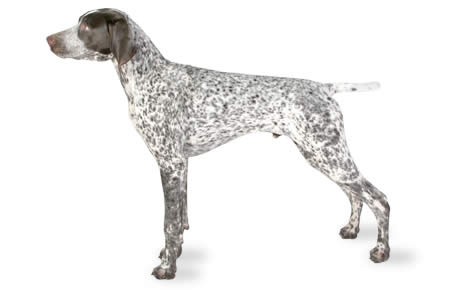German Shorthaired Pointer Breed Guide

Breed Group:
Sporting Dogs
Get 30% off
Join our Newsletter
Sign Up Today
German Shorthaired Pointer Background & History
The German Shorthaired Pointer defines the word athleticism. Whether hunting small game or tracking deer, the German Shorthaired Pointer has an intense sense of smell and sheer endurance making them the perfect hunting partner. This breed began their duties in Germany during the 17th century and became a beloved companion for both hunters and families throughout the area.
The first German Shorthaired Pointer that made it to the United States was in 1925. Within 5 short years, they had already become recognized by the American Kennel Club. Ever since their introduction into America, this breed has gained popularity unlike any other. In fact, During the 1950’s and 60’s, the German Shorthaired Pointer became a successful participant in both the showing and in field competitions.
German Shorthaired Pointer Temperament & Personality
The German Shorthaired Pointer craves adventure. Whether it be swimming, playing fetch, or hunting game, they long for any type of physical challenge. Aside from their mastery in hunting, they also can be incredibly affectionate and loving with their owners. A family setting for a German Shorthaired Pointer is ideal for this breed. They are playful and energetic, perfect as a running buddy or even a distraction for the kids.
However, it is important to keep in mind that this breed does not like to be left alone for too long. In fact, German Shorthaired Pointer’s can develop separation anxiety, so it’s absolutely critical they have an owner who can provide them with the proper attention they need.
German Shorthaired Pointer Training
Due to their high intelligence, the German Shorthaired Pointer is an enjoyable breed to train. Simple commands and tricks are a breeze for these pups, and they’re expecting a constant challenge to keep them entertained.
With any dog training, make sure to socialize your German Shorthaired Pointer as early on as possible. Introduce them to different people, sounds, and experiences so they can be a well-mannered household pet later on in life.
German Shorthaired Pointer Exercise
As previously stated, your German Shorthaired Pointer needs plenty of exercise to stay happy and healthy. A quick trip around the block is not going to cut it for this breed. They are going to need at least an hour or two of physical exercise on a daily basis. When a German Shorthaired Pointer does not get the stimulation that they need, they will quickly become restless and destructive around the home to create their own source of entertainment.
German Shorthaired Pointer Lifespan
The average German Shorthaired Pointer lifespan is between 12 to 14 years.
German Shorthaired Pointer Breed Popularity
Ever since the German Shorthaired Pointer made its way to the United States, it has been a popular addition to many households. Even today this breed has a popularity well above the majority. According to the American Kennel Club, the German Shorthaired Pointer is ranked 11th out of 155 for being one of the most popular dog breeds in the United States.
German Shorthaired Pointer Feeding
A German Shorthaired Pointer should receive 2 to 3 cups of high-quality food a day, split into two separate meals. Keep in mind that all dogs have different nutritional needs and their food intake should be adjusted accordingly. It is also important to have a bowl of fresh water available at all times to avoid dehydration.
German Shorthaired Pointer Grooming
The short water-repellent coat of the German Shorthaired Pointer doesn’t require coat grooming often. Weekly brushing with a firm bristle brush is highly recommended to keep this breeds coat in optimal condition. It is also important to clean their teeth on a regular basis to avoid bacteria or tartar from building up. Lastly, check your dog’s eyes and ears for any type of developing an infection.
Are German Shorthaired Pointers Good With kids?
The energetic and lively personality of a German Shorthaired Pointer is perfect for children of all ages. Both the child and dog will keep each other entertained for hours, and they will both adore the companionship the other can provide. However even if you have a well-behaved German Shorthaired Pointer, make sure an adult is around to supervise all interactions between the dog and child.
German Shorthaired Pointer Health Problems
This breed is generally healthy, however, they are still susceptible to several health complications. German Shorthaired Pointer health problems are as followed:
Hip dysplasia: Unfortunately, hip dysplasia is a common genetic disorder that affects larger dog breeds, including the German Shorthaired Pointer. Hip dysplasia in dogs occurs when the hip socket and thighbone do not fit properly together, wearing down the cartilage and surrounding bone. Eventually, this hereditary complication will cause pain, lameness, or even arthritis.
Entropion: German Shorthaired Pointers are also susceptible to developing eye issues. Entropion in dogs occurs when the eyelids roll inward, causing irritation or damage to the cornea. Luckily, this eye issue can be cured with corrective surgery.
Von Willebrand’s Disease: Von Willebrand’s Disease in dogs is a blood disorder that affects the clotting process. A dog that is affected with this disease will experience excessive nosebleeds, prolonged bleeding after surgery, or bleeding gums. While there is still no cure for Von Willebrand’s Disease as of right now, there are treatment methods that help to reduce the severity of the symptoms.
Other Resources
National Breed Website: German Shorthaired Pointer Club of America
